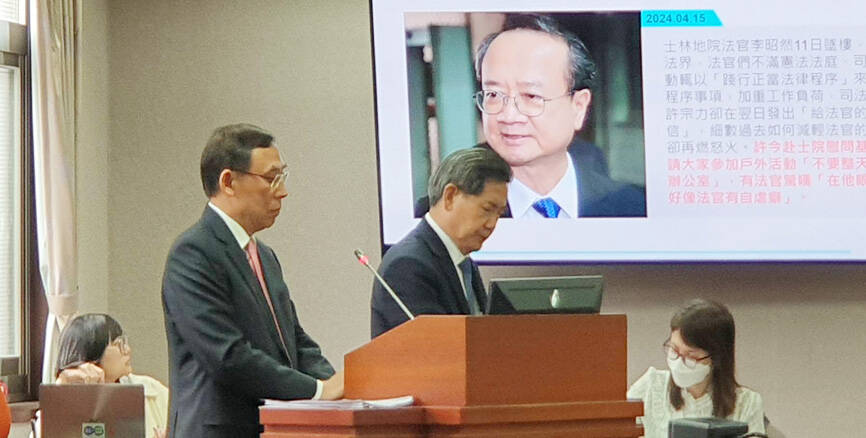The Judicial Yuan yesterday said it has proposed amendments to the Court Organization Act (法院組織法) and other laws in a bid to hire more judicial staff and tackle the issue of overwork.
Case numbers have risen significantly in the past few years, which has led to judges, clerks and other staff being overworked, the Judicial Yuan said.
A judge fell to his death from a building, a judge fell into a coma in his office and a clerk passed away from illness, it said, citing what it called cases linked to overwork.

Photo: Yang Kuo-wen, Taipei Times
To meet its personnel needs and process outstanding cases, 5,536 new staff would need to be hired, it said.
“We hope the Executive Yuan’s Directorate-General of Personnel Administration can recognize the urgent need for additional judiciary staff,” it said, adding that it hoped the Act Governing the Total Number of Personnel Headcounts of Central Government Agencies (行政院人事行政總處) could be amended to allow more hiring.
A Judicial Yuan report said that the number of annual cases received by local courts over the past decade grew by 28 percent from 2.84 million in 2014 to 3.63 million last year.
The number of open cases also rose, increasing from 187,635 in 2014 to 367,171 last year, or 96 percent, the report said.
Although measures have been implemented to reduce the burden on the court system, it was still unable to keep up with the growth in case numbers, it said.
The law stipulates that the Judicial Yuan and its agencies combined are allowed a maximum of 15,000 staff members.
The agencies budgeted for 14,508 staff members this year, but an additional 5,536 would be needed to clear open cases, the Judicial Yuan said.
The Legislative Yuan’s Judiciary and Organic Laws and Statutes Committee yesterday met with Judicial Yuan Secretary-General Wu San-lung (吳三龍) and cross-party legislators.
The committee asked Wu to prepare a report on how the burden on the court system could be reduced through “administrative simplification, litigation reduction and the application of technology.”
Democratic Progressive Party (DPP) caucus secretary-general Rosalia Wu (吳思瑤) echoed calls for an increase in judicial hirings, and called for better treatment of judicial personnel and the implementation of a dispute pyramid, which would see more issues settled outside of court.
DPP Legislator Chen Chun-yu (陳俊宇) asked Wu what a reasonable caseload would be for the judiciary.
Wu said that he would discuss the issue with judicial staff.
Chinese Nationalist Party (KMT) Legislator Lo Chih-chiang (羅智強) also called for increased hiring of judicial staff and said he had drafted an amendment on the issue.
Taiwan People’s Party Legislator Huang Kuo-chang (黃國昌) said that the Judges’ Association of the Republic of China had already issued a statement asking the Judicial Yuan to tackle the staff shortage issue and to respond to it with a proposal within one month.
Wu said he would do his best to respond to the association within that time.

Taiwan is gearing up to celebrate the New Year at events across the country, headlined by the annual countdown and Taipei 101 fireworks display at midnight. Many of the events are to be livesteamed online. See below for lineups and links: Taipei Taipei’s New Year’s Party 2026 is to begin at 7pm and run until 1am, with the theme “Sailing to the Future.” South Korean girl group KARA is headlining the concert at Taipei City Hall Plaza, with additional performances by Amber An (安心亞), Nick Chou (周湯豪), hip-hop trio Nine One One (玖壹壹), Bii (畢書盡), girl group Genblue (幻藍小熊) and more. The festivities are to

Auckland rang in 2026 with a downtown fireworks display launched from New Zealand’s tallest structure, Sky Tower, making it the first major city to greet the new year at a celebration dampened by rain, while crowds in Taipei braved the elements to watch Taipei 101’s display. South Pacific countries are the first to bid farewell to 2025. Clocks struck midnight in Auckland, with a population of 1.7 million, 18 hours before the famous ball was to drop in New York’s Times Square. The five-minute display involved 3,500 fireworks launched from the 240m Sky Tower. Smaller community events were canceled across New Zealand’s

‘IRRESPONSIBLE’: Beijing’s constant disruption of the ‘status quo’ in the Taiwan Strait has damaged peace, stability and security in the Indo-Pacific region, MOFA said The Presidential Office yesterday condemned China’s launch of another military drill around Taiwan, saying such actions are a “unilateral provocation” that destabilizes regional peace and stability. China should immediately stop the irresponsible and provocative actions, Presidential Office spokeswoman Karen Kuo (郭雅慧) said, after the Chinese People’s Liberation Army (PLA) yesterday announced the start of a new round of joint exercises around Taiwan by the army, navy and air force, which it said were approaching “from different directions.” Code-named “Justice Mission 2025,” the exercises would be conducted in the Taiwan Strait and in areas north, southwest, southeast and east of Taiwan

UNDER WAY: The contract for advanced sensor systems would be fulfilled in Florida, and is expected to be completed by June 2031, the Pentagon said Lockheed Martin has been given a contract involving foreign military sales to Taiwan to meet what Washington calls “an urgent operational need” of Taiwan’s air force, the Pentagon said on Wednesday. The contract has a ceiling value of US$328.5 million, with US$157.3 million in foreign military sales funds obligated at the time of award, the Pentagon said in a statement. “This contract provides for the procurement and delivery of 55 Infrared Search and Track Legion Enhanced Sensor Pods, processors, pod containers and processor containers required to meet the urgent operational need of the Taiwan air force,” it said. The contract’s work would be